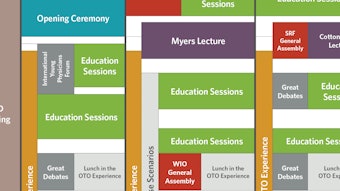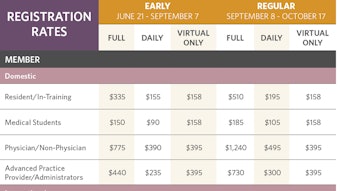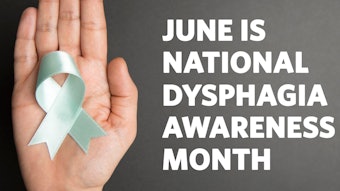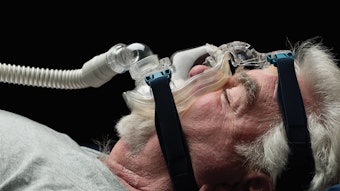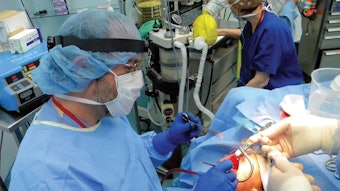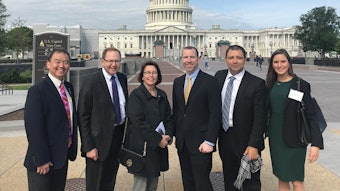Out of Committee: Geriatric Otolaryngology | COVID-19 Pandemic and the Elderly
The past year and a half have been an unprecedented time due to the COVID-19 pandemic.
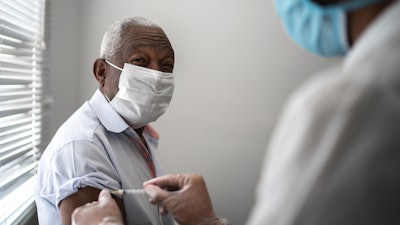
The past year and a half have been an unprecedented time due to the COVID-19 pandemic with stories of desolation, agony, and loss, but also of heroism, resilience, and hope. No doubt the most affected population has been the elderly. The elderly, representing a specific cluster of high-risk patients for developing COVID-19 with rapidly progressive clinical deterioration, suffered the highest numbers of mortality. Advanced age has been shown to be the most important predictor of fatal outcome due to COVID-19.1 The Centers for Disease Control and Prevention (CDC) reports eight out of 10 COVID-19 deaths have been in adults older than 65 years of age.2
Immunosenesence is thought to be one of the major factors leading to poor response to the virus by the elderly, as well as physiological factors seen more commonly in the elderly, such as decline in the clearance of inhaled particles from the airway and greater airway collapsibility.1,3-5 Likewise, progressive and relatively linear increase in nasal cavity volume with increasing age as well as age-dependent decrease of nasal resistance have been proposed as determinants for a higher prevalence of COVID-19 in the elderly population.1
Until recently, the primary goal throughout the pandemic response has been to prevent the elderly from getting sick. This has mostly been through social distancing. We all stopped visiting our parents and grandparents fearing we would be the ones infecting them, nursing homes and care facilities went into lockdown, and multi-generational households struggled with how to isolate in close quarters. “Cuddle curtains” made their way into our lives so the elderly can experience the much-needed human touch. Despite all efforts, many patients died alone, with families unable to comfort them during their last moments. Alzheimer’s patients have been affected even more so. Not being able to follow mask and sanitation recommendations, they have mostly been isolated to their own rooms, with complete upending of familiar routines, facies, and stimulation.
Older adults suddenly lost their support systems. A World Health Organization report in March 2020 stated “taking care of the older adults during the COVID-19 pandemic is everyone’s business.” Additionally they noted that governments should support those requiring help with access to nutritious food, basic supplies, healthcare, and money, and that the elderly should be treated with dignity.6 Unfortunately this was not the case for most and, in many instances, the elderly were blamed for causing the economy to collapse and have been chastised for being out of their homes; ageism has been widespread.7
Nevertheless, healthcare systems responded to the pandemic robustly and telemedicine increased exponentially, becoming an important part of all our daily practices. Unfortunately, the elderly were left disadvantaged. Fischer et al. reports the main factors that influence access to telemedicine are age, race, and education level. Respondents older than 65 years old reported significantly less willingness to participate in e-visits.8 Another important factor limiting the access to healthcare for the elderly was the fear of contracting COVID-19.
The mental health effects of the pandemic continue to be studied. Initial studies looking at the effects of social isolation on mental health revealed older adults did relatively better and showed fewer percentage of depression, anxiety, and trauma-related stress disorder compared to young adults.9 Similar results have been reported from other high-income countries, such as Spain and Canada.10 Van Tilburg et al., in a longitudinal study involving 1,679 community-dwelling older adults (65-102 years) in the Netherlands, stated that although loneliness increased after the pandemic, mental health levels remained unchanged.11 With the pandemic now going on for more than a year, further studies are needed to assess the long-term effects.
Once the initial response was implemented, it became obvious that we as physicians had to now learn how to manage the long-term consequences of the disease. The CDC reports that 9% of patients hospitalized for treatment required readmission to the same hospital within two months. The patients who were readmitted were more likely to be 65 years old or older, have chronic medical conditions, be hospitalized within three months prior to being diagnosed with COVID-19, and to have been discharged with home healthcare or to a short-term care facility.12
In the current phase of the pandemic with more older adults vaccinated, it is time to focus our efforts on the rehabilitation of the persistent otolaryngic effects of COVID-19. While further studies are needed to understand the extend of post-acute symptoms and persistent disability following COVID-19, some conditions have already been well documented, such as physical and mental disability; fatigue; respiratory, cardiac and renal impairments; speech and swallowing disorders; and nutritional deficits that persist for at least six months.13 The CDC also reports persistent symptoms, such as extended loss of taste and smell, cough, dyspnea, and dizziness, which will certainly lead to increased need for our specialty. Likewise, due to prolonged intubation and hospitalization of large numbers of elderly patients, we will see an increase in patients with subglottic and tracheal stenosis.
Our Academy and subspecialty societies have responded with an immense sense of duty. This vast amount of work was on display at a multispecialty panel during the recent Triological Society Meeting. The American Society of Geriatric Otolaryngology (ASGO) has been working diligently on various research projects as well as putting together a conference series on geriatric care. The next meeting, a joint ASGO–Duke University symposium, will focus on perioperative care in the elderly. This will be followed by a presentation on Healthcare Inequities in Geriatric Otolaryngology in September. The series will end with a focus on taste and smell dysfunction in the aging. For more information, visit the ASGO website at https://www.amsocgeriatricotolaryngology.org/meetings.
The discussion of these issues could not be timelier. The pandemic has laid bare the inequities in being able to access healthcare, technology, nutrition, and basic necessities. Older people have been significantly affected with increased isolation, ageism, and even abuse. It is imperative to assess patients for signs of neglect and work on improving access to healthcare for older patients, all while focusing on rehabilitation of pandemic-related disorders.
References
1. Perrotta F, Corbi G, Mazzeo G, et al. COVID-19 and the elderly: insights into pathogenesis and clinical decision-making. Aging Clin Exp Res. 2020;32:1599-1608.
2. https://www.cdc.gov/coronavirus/2019-ncov/need-extra-precautions/older-adults.html
3. Svartengren M, Falk R, Philipson K. Long-term clearance from small airways decreases with age. Eur Respir J. 2005;26:609-615.
4. Levitzky MG. Effects of aging on the respiratory system. Physiologist. 1984 Apr;27(2):102-107.
5. Martin SE, Mathur R, Marshall I. The effect of age, sex, obesity and posture on upper airway size. Eur Respir J. 1997;10:2087-2090.
7. Skoog I. COVID-19 and mental health among older people in Sweden. Int Psychogeriatr. 2020;32:1173-1175.
8. Fischer SH, Ray KN, Mehrotra A, et al. Prevalence and characteristics of telehealth utilization in the United States. JAMA Netw Open. 2020;3:e2022302.
9. Vahia IV, Jeste DV, Reynolds CF. Older adults and the mental health effects of COVID-19. JAMA. 2020;324:2253-2254.
10. González-Sanguino C, Ausín B, Castellanos MA, et al. Mental health consequences during the initial stage of the 2020 coronavirus pandemic (COVID-19) in Spain. Brain Behav Immun. 2020;87:172-176.
11. Van Tilburg TG, Steinmetz S, Stolte E, et al. Loneliness and mental health during the COVID-19 pandemic. J Gerontol B Psychol Sci Soc Sci. 2020. https://doi.org/10.1093/geronb/gbaa111
12. https://www.cdc.gov/mmwr/volumes/69/wr/mm6945e2.htm
13. https://www.cdc.gov/coronavirus/2019-ncov/hcp/clinical-care/post-covid-conditions.html
